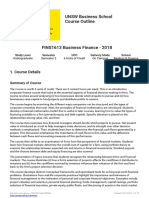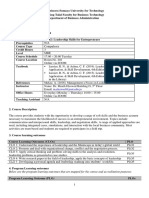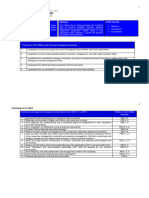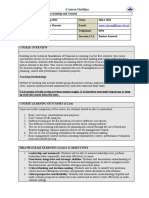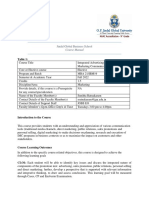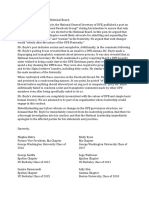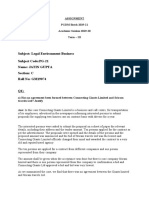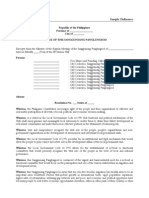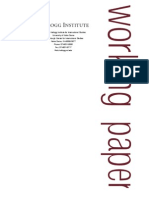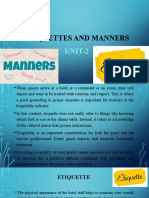FINS3625 Course Outline
FINS3625 Course Outline
Uploaded by
tim lCopyright:
Available Formats
FINS3625 Course Outline
FINS3625 Course Outline
Uploaded by
tim lOriginal Description:
Copyright
Available Formats
Share this document
Did you find this document useful?
Is this content inappropriate?
Copyright:
Available Formats
FINS3625 Course Outline
FINS3625 Course Outline
Uploaded by
tim lCopyright:
Available Formats
UNSW Business School
Course Outline
FINS3625 Applied Corporate Finance - 2019
Study Level Term UOC Location School
Undergraduate Term 1 6 Units of Credit On Campus Banking & Finance
business.unsw.edu.au - CRICOS Code 00098G | Printed: 11/1/2019 | 1 of 19
View course outline in browser
1. Course Details
Summary of Course
This course focuses on practical applications related to financial decision making. Case studies,
empirical evidences and current events are used to illustrate the process of making financial decisions
commonly faced by corporate managers, investment bankers, investors and regulators. Topics discussed
include: advanced issues in corporate valuation and capital budgeting; raising capital; valuation and
analysis of real options; leverage choice, mergers and acquisitions and the market for corporate control
and governance; and other advanced topics in Corporate Finance. The course also aims to help students
develop oral and writing skills through group assignments and case studies.
Teaching Times and Locations
Please note that teaching times and locations are subject to change. Students are strongly advised to
refer to the Class Timetable website for the most up-to-date teaching times and locations.
View course timetable
Course Policies & Support
The Business School expects that you are familiar with the contents of this course outline and the UNSW
and Business School learning expectations, rules, policies and support services as listed below:
Program Learning Outcomes
Academic Integrity and Plagiarism
Student Responsibilities and Conduct
Special Consideration
Protocol for Viewing Final Exam Scripts
Student Learning Support Services
Further information is provided in the Assessment and Policies and Support sections.
Course Aims and Relationship to Other Courses
This course focuses on the application and further development of financial concepts first introduced in
FINS1613 Business Finance in the corporate finance setting. It applies finance theory for the purposes of
valuating businesses and understanding corporate financial transactions.
This course assumes at a minimum that students are well-versed in the topics covered in FINS1613.
Student Learning Outcomes
The Course Learning Outcomes (CLOs) are what you should be able to demonstrate by the end of this
course, if you participate fully in learning activities and successfully complete the assessment items.
CLOs also contribute to your achievement of the Program Learning Outcomes (PLOs), which are
developed across the duration of a program for all coursework students in the Business School. More
information on PLOs is available under Policies and Support . PLOs are, in turn, directly linked to UNSW
business.unsw.edu.au - CRICOS Code 00098G | Printed: 11/1/2019 | 2 of 19
View course outline in browser
graduate capabilities and the aspiration to develop “globally focussed graduates who are rigorous
scholars, capable of leadership and professional practice in an international community”.
The following table shows how the CLOs for this course relate to the overall PLOs and indicates where
each CLO and PLO is assessed:
Course Learning Outcomes Program Learning Course Assessment Item
Outcomes
On successful completion of the course, you This course helps you to This learning outcome will be
should be able to: develop the following assessed in the following
Program Learning items:
Outcomes:
PLO 1: Business Tutorial Contribution/Case
Understand and apply the set of tools
knowledge Study
needed in corporate financial decision
Midterm Exam
making.
Final Exam
PLO 2: Problem solving Tutorial Contribution/Case
Forecast cash flow surplus or cash flow
Study
needs.
Midterm Exam
PLO 1: Business Tutorial Contribution/Case
Apply tools to value businesses, projects and
knowledge Study
assess their financial risks.
PLO 2: Problem solving Midterm Exam
PLO 1: Business Tutorial Contribution/Case
Apply the knowledge and the tools acquired
knowledge Study
in any corporate financing setting.
PLO 2: Problem solving Final Exam
PLO 2: Problem solving Tutorial Contribution/Case
Assess the importance of corporate
Study
governance.
Final Exam
PLO 1: Business Tutorial Contribution/Case
Assess and value corporate mergers.
knowledge Study
PLO 2: Problem solving Final Exam
PLO 2: Problem solving Tutorial Contribution/Case
Analyse and present a case and respond to
PLO 3: Business Study
questions professionally as a team.
communication Report/Presentation/
Discussion
PLO 3: Business Case Study
Construct written work, which is logically
communication Report
and professionally presented.
PLO 3: Business Tutorial Contribution/Case
Communicate in writing and orally finance
communication Study
related ideas in a theoretically and applicably
Report/Presentation/
sound manner.
Discussion
PLO 4: Teamwork Tutorial Contribution/Case
Participate collaboratively and responsibly in
Study
teams for the goal of achieving enhanced
learning outcomes.
PLO 6: Global and Tutorial Contribution/Case
Participate collaboratively and responsibly in
cultural competence Study
culturally and racially diverse groups and
tutorials for the goal of achieving enhanced
business.unsw.edu.au - CRICOS Code 00098G | Printed: 11/1/2019 | 3 of 19
View course outline in browser
Course Learning Outcomes Program Learning Course Assessment Item
Outcomes
learning outcomes.
PLO 7: Leadership Tutorial Contribution/Case
Develop a sound understanding of tools to
development Study
analyze and act innovatively in a diverse set
Midterm Exam
of business circumstances with the aim to
Final Exam
achieve positive outcomes for corporate
stakeholders.
business.unsw.edu.au - CRICOS Code 00098G | Printed: 11/1/2019 | 4 of 19
View course outline in browser
2. Staff Contact Details
Position Title Name Email Location Phone Consultation
Times
Lecturer- AProf Jo-Ann Suchard Email Room 346, +61 2 9385 –
in- UNSW 5876
charge Business
School
building - Ref
E12
business.unsw.edu.au - CRICOS Code 00098G | Printed: 11/1/2019 | 5 of 19
View course outline in browser
3. Learning and Teaching Activities
Approach to Learning and Teaching in the Course
We seek to create an interesting, challenging, relevant and engaging education experience.
To help achieve this objective we have several teaching aims:
Create a climate of engagement, dialogue and ongoing feedback between students and lecturers
regarding the content, teaching strategies, learning experiences and outcomes;
Cater to a variety of learning preferences and abilities by providing a range of learning activities and
teaching methods;
Develop independent learning skills and create an environment that provides structure and guidance as
well as encouraging students to extend their learning;
Develop skills in collaboration and teamwork, which is directly relevant to the skills required of a
finance professional.
Learning Activities and Teaching Strategies
The Role of Lectures
The lectures build from the relevant core readings (in the textbook) to set out the main ideas, theories and
conceptual frameworks for the course. Lectures include interactive learning processes and will synthesize
materials from a range of sources, including your own prior knowledge and experiences. We expect you to
come to and be prepared for each lecture. This means you should have read and considered the relevant
chapter. From a time management perspective, this means you will need to allocate at least three hours
per week for basic reading. If you need any assistance in managing your time you will find the Business
School’s Education Development Unit (EDU) a useful resource.
The Role of Tutorials
The weekly tutorials provide you with an interactive environment in which to enhance your learning and
your enjoyment of the course. These tutorials include exercises and case study presentation and
discussions. By actively engaging in the tutorials, you will increase your confidence and competence in
technical, presentation and critical thinking skills. They also provide you with the opportunity to enhance
your interpersonal skills by interacting with others, working together in diverse groups, forging learning
networks, learning about other cultures and learning to understand values and opinions different from
your own.
business.unsw.edu.au - CRICOS Code 00098G | Printed: 11/1/2019 | 6 of 19
View course outline in browser
4. Assessment
Formal Requirements
In order to pass this course, you must:
achieve a composite mark of at least 50 out of 100;
meet any additional requirements described in the Assessment Summary section.
You are expected to attempt all assessment requirements in the course.
Assessment Structure
Assessment Task Weighting Length Due Date
5%
Tutorial Contribution/Case Study Ongoing Weeks 1-10
30% –
Report/Presentation/Discussion Ongoing
30%
Midterm Exam 1 hour and 45 minutes In-Class during Week 7
35% –
Final Exam 2 hours
Assessment Summary
As a student at UNSW you are expected to display academic integrity in your work and interactions.
Where a student breaches the UNSW Student Code with respect to academic integrity, the University may
take disciplinary action under the Student Misconduct Procedure.
To assist you in understanding what academic integrity means, and how to ensure that you do comply
with the UNSW Student Code, it is strongly recommended that you complete the Working with Academic
Integrity module before submitting your first assessment task. It is a free, online self-paced Moodle
module that should take about one hour to complete.
You should complete the Working with Academic Integrity module before submitting any written
assessment by the due date. Non-compliance with the UNSW Student Code may result in disciplinary
action.
Tutorials in this course are 1 hour and 30 minutes long and held weekly (weeks 1-10). Tutorials are
composed of two major parts:
1. Group case study presentations and discussion
2. Assigned problem solving from textbook and/or other resources
Tutorial Contribution/Case Study (5%)
Tutorial sessions require students to discuss issues, and work through problems related to the lecture
material and course text. Tutors will assess their student’s (particularly students not assigned the case of
the week) performance based on their participation. Punctual attendance is necessary and does not
constitute a basis for passing this component. Students must be active and participative.
business.unsw.edu.au - CRICOS Code 00098G | Printed: 11/1/2019 | 7 of 19
View course outline in browser
Report/Presentation/Discussion of Case studies (30%)
Students are required to form groups of 5-6 members to analyse, present and discuss a case study.
Groups are to be assigned and finalized by the tutor during week 2 tutorials. Two cases will be assigned to
each group: one for report writing, presentation and discussion; and one for reverse role playing and
discussion. The presenting group members play the role of investment banker/advisor or corporate
managers analysing and presenting their case to an audience such as the board of directors of the
company which is reverse-role played by another group. The presenting group is required to submit a
written report of no more than three pages in text (A4, 12-point fonts, double spaced format) to the tutor,
and to provide to the opposing group with a summary of key points in their presentation (and executive
summary). An aggregate mark of up to 30% of total course mark will be awarded based on case study
presentation (up to 15%) and submitted report (up to 15%).
Early Assessment Quiz (0%)
A quiz will be held online or during a tutorial session. The quiz will cover topics discussed in earlier
lectures. The sole purpose of this quiz is to provide students early feedback before the Census Date.
Mid-Session and Final Examinations (30%+35%)
The two examinations focus on evaluating students’ understanding of the main concepts covered in the
course. Both examinations may consist of multiple choice, short essay and problem-solving questions
that tests students’ knowledge of relevant theories and methodologies related to Corporate Finance. The
final exam is not comprehensive and will cover those topics not covered on the mid-session exam. The
mid-session exam will be held in-class in Week 7. The final examination will be held during the University
Exam Period.
Assignment Submission Procedure
Case Study Report and Executive Summary
The presenting group is required to submit a written report of no more than three pages in text (A4, 12-
point fonts, double spaced format). A hard copy of the case report is to be handed in after the
presentation to the tutor. A summary of key points in the presentation (and executive summary) is to be
provided to the group doing the reverse-role playing before the tutorial. A soft copy of the case reports will
be submitted by the tutors to Turnitin for plagiarism. Detailed requirements and assessment criteria for
the case presentation, report and discussion are available on Moodle.
Assessment Feedback
Feedback on student performance from formative and summative assessment tasks will be provided to
students in a timely manner. Assessment tasks completed within the teaching period of a course, other
than a final assessment, will be assessed and students provided with feedback, with or without a
provisional result, within 10 working days of submission, under normal circumstances. Feedback on
continuous assessment tasks (e.g. laboratory and studio-based, workplace-based, weekly quizzes) will be
provided prior to the midpoint of the course.
Special Consideration
business.unsw.edu.au - CRICOS Code 00098G | Printed: 11/1/2019 | 8 of 19
View course outline in browser
You can apply for special consideration when illness or other circumstances beyond your control interfere
with your performance in a specific assessment task or tasks. Special Consideration is primarily intended
to provide you with an extra opportunity to demonstrate the level of performance of which you are
capable.
Please note the following:
1. Applications will not be accepted by teaching staff. The lecturer-in-charge/course coordinator will be
automatically notified when you lodge an online application for special consideration.
2. Decisions and recommendations are only made by lecturers-in-charge/course coordinators (or by the
Faculty Panel in the case of final exam special considerations), not by tutors.
3. Applying for special consideration does not automatically mean that you will be granted a
supplementary exam or other concession.
4. Special consideration requests do not allow the awarding of additional marks to students.
Further information on Business School policy and procedure, as well as supplementary exam dates for
the current term, can be found under “Special Consideration” on the Policies and Support page.
The School of Banking and Finance supports the concept to leave the course lecturer-in-charge
to stipulate a penalty of 0 to 10% of the percentage weight of the assessment component or part
thereof per day. Details of such penalties will be available on the course Moodle page.
Applications for extension are restricted to cases of serious illness, bereavement or
misadventure and students must provide documentary evidence. Decisions on such applications
will be based on policies that are consistent with the policies adopted by UNSW Business School
for such cases.
Protocol for Viewing Final Exam Scripts
The UNSW Business School has set a protocol under which students may view their final exam
script. Individual schools within the Faculty may also set up a local process for viewing final
exam scripts, so it is important that you check with your School. Further school specific
information may be included below.
Further to the Business School protocol for viewing final exam scripts:
1. A student must lodge a request to view his or her final exam script within 5 working days immediately
following the official release of overall course results. This request must be emailed to the School of
Banking and Finance at Email.
2. The School may fix a time at which all students wishing to see their exams will be permitted to do so.
The date for viewing all final exam scripts with the School of Banking and Finance is the 10th working
day after the official release of overall course results, and the School may fix a time for each course on
that day. The School may refuse to allow access to the exams at other times.
Protocol for Viewing Other Exam Scripts is the similar to that of viewing final exam scripts except
the working days are defined with reference to the release date of specific assessment result.
Quality Assurance
The Business School is actively monitoring student learning and quality of the student experience in all its
programs. A random selection of completed assessment tasks may be used for quality assurance, such
as to determine the extent to which program learning goals are being achieved. The information is
required for accreditation purposes, and aggregated findings will be used to inform changes aimed at
improving the quality of Business School programs. All material used for such processes will be treated
as confidential.
business.unsw.edu.au - CRICOS Code 00098G | Printed: 11/1/2019 | 9 of 19
View course outline in browser
business.unsw.edu.au - CRICOS Code 00098G | Printed: 11/1/2019 | 10 of 19
View course outline in browser
5. Course Resources
You will be able to obtain the latest course announcements and course material via Moodle. Lecture
slides and/or notes will be available for download by Friday of the week preceding the lecture. Students
are encouraged to read the corresponding reference material prior to lectures. Topic coverage in tutorials
lags the lectures by one week. Solutions to assigned problems will be posted after the tutorial coverage.
The website for this course is on Moodle.
The textbook for this course is:
Brigham and Daves, Intermediate Financial Management, 13th ed. South-Western. [12 or 11th
editions are usable but students are responsible for updating the differences in chapter numbers
and end of chapter problems. The course tutorials will focus extensively on the end of the
chapter problems.]
Other good and optional textbooks include:
Ross, Westerfield, Jordan, Corporate Finance, McGraw-Hill Irwin [a different style textbook];
Brealey, Myers, Allen, Corporate Finance. McGraw-Hill Irwin [a classic, revised over the years]; and
Grinblatt and Titman. Financial Markets and Corporate Strategy. McGraw-Hill Irwin. [Advanced, for the
serious finance students, not for the faint-hearted].
business.unsw.edu.au - CRICOS Code 00098G | Printed: 11/1/2019 | 11 of 19
View course outline in browser
6. Course Evaluation & Development
Feedback is regularly sought from students and continual improvements are made based on this
feedback. At the end of this course, you will be asked to complete the myExperience survey , which
provides a key source of student evaluative feedback. Your input into this quality enhancement process is
extremely valuable in assisting us to meet the needs of our students and provide an effective and
enriching learning experience. The results of all surveys are carefully considered and do lead to action
towards enhancing educational quality.
As a result of past student suggestions, the tutorial format has been modified to allow for a more
engaging learning experience.
business.unsw.edu.au - CRICOS Code 00098G | Printed: 11/1/2019 | 12 of 19
View course outline in browser
7. Course Schedule
Week Activity Topic Assessment/
Other
Week 1: 18 Lecture –
February Pro Forma Statements,
Projection of CFs and
Short-Term financing
needs.
Week 2: 25 Lecture –
February Cost of Capital
Week 3: 4 Lecture –
March Corporate Valuation/
Capital Budgeting
Week 4: 11 Lecture –
March Real Options
Week 5: 18 Lecture –
March Capital Structure
Week 6: 25 Midterm –
March Exam In-Class Midterm
Exam
Week 7: 1 Lecture –
April Equity Financing
Week 8: 8 Lecture –
April Debt Financing and M&A
I
Week 9: 15 Lecture –
April M&A II and Guest
Speaker
Week 10: 22 Lecture –
April Corporate Governance
Term Break: – – –
29 April
Exams: 6 May – – –
Exams: 13 – – –
May
business.unsw.edu.au - CRICOS Code 00098G | Printed: 11/1/2019 | 13 of 19
View course outline in browser
8. Policies and Support
Information about UNSW Business School protocols, University policies, student responsibilities and
education quality and support.
Program Learning Outcomes
The Business School places knowledge and capabilities at the core of its curriculum via seven Program
Learning Outcomes (PLOs). These PLOs are systematically embedded and developed across the
duration of all coursework programs in the Business School.
PLOs embody the knowledge, skills and capabilities that are taught, practised and assessed within each
Business School program. They articulate what you should know and be able to do upon successful
completion of your degree.
Upon graduation, you should have a high level of specialised business knowledge and capacity for
responsible business thinking, underpinned by ethical professional practice. You should be able to
harness, manage and communicate business information effectively and work collaboratively with
others. You should be an experienced problem-solver and critical thinker, with a global perspective,
cultural competence and the potential for innovative leadership.
All UNSW programs and courses are designed to assess the attainment of program and/or course level
learning outcomes, as required by the UNSW Assessment Design Procedure . It is important that you
become familiar with the Business School PLOs, as they constitute the framework which informs and
shapes the components and assessments of the courses within your program of study.
PLO 1: Business knowledge
Students will make informed and effective selection and application of knowledge in a discipline or
profession, in the contexts of local and global business.
PLO 2: Problem solving
Students will define and address business problems, and propose effective evidence-based solutions,
through the application of rigorous analysis and critical thinking.
PLO 3: Business communication
Students will harness, manage and communicate business information effectively using multiple forms
of communication across different channels.
PLO 4: Teamwork
Students will interact and collaborate effectively with others to achieve a common business purpose or
fulfil a common business project, and reflect critically on the process and the outcomes.
PLO 5: Responsible business practice
Students will develop and be committed to responsible business thinking and approaches, which are
underpinned by ethical professional practice and sustainability considerations.
PLO 6: Global and cultural competence
Students will be aware of business systems in the wider world and actively committed to recognise and
respect the cultural norms, beliefs and values of others, and will apply this knowledge to interact,
communicate and work effectively in diverse environments.
PLO 7: Leadership development
Students will develop the capacity to take initiative, encourage forward thinking and bring about
business.unsw.edu.au - CRICOS Code 00098G | Printed: 11/1/2019 | 14 of 19
View course outline in browser
innovation, while effectively influencing others to achieve desired results.
These PLOs relate to undergraduate and postgraduate coursework programs. Separate PLOs for
honours and postgraduate research programs are included under 'Related Documents'.
Business School course outlines provide detailed information for students on how the course learning
outcomes, learning activities, and assessment/s contribute to the development of Program Learning
Outcomes.
RELATED DOCUMENTS
Undergraduate Honours Program Learning Goals and Outcomes (pdf)
Master of Philosophy Program Learning Goals and Outcomes (pdf)
Doctor of Philosophy Program Learning Goals and Outcomes (pdf)
UNSW Graduate Capabilities
The Business School PLOs also incorporate UNSW graduate capabilities , a set of generic abilities and
skills that all students are expected to achieve by graduation. These capabilities articulate the
University’s institutional values, as well as future employer expectations.
UNSW Graduate Capabilities Business School PLOs
Scholars capable of independent and PLO 1: Business knowledge
collaborative enquiry, rigorous in their analysis, PLO 2: Problem solving
critique and reflection, and able to innovate by PLO 3: Business communication
applying their knowledge and skills to the solution PLO 4: Teamwork
of novel as well as routine problems. PLO 7: Leadership development
Entrepreneurial leaders capable of initiating and PLO 1: Business knowledge
embracing innovation and change, as well as PLO 2: Problem solving
engaging and enabling others to contribute to PLO 3: Business communication
change PLO 4: Teamwork
PLO 6: Global and cultural competence
PLO 7: Leadership development
Professionals capable of ethical, self-directed PLO 1: Business knowledge
practice and independent lifelong learning PLO 2: Problem solving
PLO 3: Business communication
PLO 5: Responsible business practice
Global citizens who are culturally adept and PLO 1: Business knowledge
capable of respecting diversity and acting in a PLO 2: Problem solving
socially just and responsible way. PLO 3: Business communication
PLO 4: Teamwork
PLO 5: Responsible business practice
PLO 6: Global and cultural competence
While our programs are designed to provide coverage of all PLOs and graduate capabilities, they also
business.unsw.edu.au - CRICOS Code 00098G | Printed: 11/1/2019 | 15 of 19
View course outline in browser
provide you with a great deal of choice and flexibility. The Business School strongly advises you to
choose a range of courses that assist your development against the seven PLOs and four graduate
capabilities, and to keep a record of your achievements as part of your portfolio. You can use a portfolio
as evidence in employment applications as well as a reference for work or further study. For support
with selecting your courses contact the UNSW Business School Student Centre .
Academic Integrity and Plagiarism
Academic Integrity is honest and responsible scholarship. This form of ethical scholarship is highly
valued at UNSW. Terms like Academic Integrity, misconduct, referencing, conventions, plagiarism,
academic practices, citations and evidence based learning are all considered basic concepts that
successful university students understand. Learning how to communicate original ideas, refer sources,
work independently, and report results accurately and honestly are skills that you will be able to carry
beyond your studies.
The definition of academic misconduct is broad. It covers practices such as cheating, copying and
using another person’s work without appropriate acknowledgement. Incidents of academic misconduct
may have serious consequences for students.
Plagiarism
UNSW regards plagiarism as a form of academic misconduct. UNSW has very strict rules regarding
plagiarism. Plagiarism at UNSW is using the words or ideas of others and passing them off as your
own. All Schools in the Business School have a Student Ethics Officer who will investigate incidents of
plagiarism and may result in a student’s name being placed on the Plagiarism and Student Misconduct
Registers.
Below are examples of plagiarism including self-plagiarism: Copying: Using the same or very
similar words to the original text or idea without acknowledging the source or using quotation
marks. This includes copying materials, ideas or concepts from a book, article, report or other
written document, presentation, composition, artwork, design, drawing, circuitry, computer
program or software, website, internet, other electronic resource, or another person's
assignment, without appropriate acknowledgement of authorship.
Inappropriate Paraphrasing: Changing a few words and phrases while mostly retaining the original
structure and/or progression of ideas of the original, and information without acknowledgement. This
also applies in presentations where someone paraphrases another’s ideas or words without credit and
to piecing together quotes and paraphrases into a new whole, without appropriate referencing.
Collusion: Presenting work as independent work when it has been produced in whole or part in
collusion with other people. Collusion includes:
Students providing their work to another student before the due date, or for the purpose of them
plagiarising at any time
Paying another person to perform an academic task and passing it off as your own
Stealing or acquiring another person’s academic work and copying it
Offering to complete another person’s work or seeking payment for completing academic work
Collusion should not be confused with academic collaboration (i.e., shared contribution towards a
group task).
Inappropriate Citation: Citing sources which have not been read, without acknowledging the 'secondary'
source from which knowledge of them has been obtained.
Self-Plagiarism: ‘Self-plagiarism’ occurs where an author republishes their own previously written work
and presents it as new findings without referencing the earlier work, either in its entirety or partially.
Self-plagiarism is also referred to as 'recycling', 'duplication', or 'multiple submissions of research
business.unsw.edu.au - CRICOS Code 00098G | Printed: 11/1/2019 | 16 of 19
View course outline in browser
findings' without disclosure. In the student context, self-plagiarism includes re-using parts of, or all of, a
body of work that has already been submitted for assessment without proper citation.
To see if you understand plagiarism, do this short quiz: https://student.unsw.edu.au/plagiarism-quiz
Cheating
The University also regards cheating as a form of academic misconduct. Cheating is knowingly
submitting the work of others as their own and includes contract cheating (work produced by an
external agent or third party that is submitted under the pretences of being a student’s original piece of
work). Cheating is not acceptable at UNSW.
If you need to revise or clarify any terms associated with academic integrity you should explore the
'Working with Academic Integrity' self-paced lessons available at: https://student.unsw.edu.au/aim .
For UNSW policies, penalties, and information to help you avoid plagiarism see: https://
student.unsw.edu.au/plagiarism as well as the guidelines in the online ELISE tutorials for all new UNSW
students: http://subjectguides.library.unsw.edu.au/elise . For information on student conduct see:
https://student.unsw.edu.au/conduct .
For information on how to acknowledge your sources and reference correctly, see: https://
student.unsw.edu.au/referencing . If you are unsure what referencing style to use in this course, you
should ask the lecturer in charge.
Student Responsibilities and Conduct
Students are expected to be familiar with and adhere to university policies in relation to class
attendance and general conduct and behaviour, including maintaining a safe, respectful environment;
and to understand their obligations in relation to workload, assessment and keeping informed.
Information and policies on these topics can be found on the 'Managing your Program' website .
Workload
It is expected that you will spend at least ten to twelve hours per week studying for a course except for
Summer Term courses which have a minimum weekly workload of twenty to twenty four hours . This
time should be made up of reading, research, working on exercises and problems, online activities and
attending classes. In periods where you need to complete assignments or prepare for examinations, the
workload may be greater. Over-commitment has been a cause of failure for many students. You should
take the required workload into account when planning how to balance study with employment and
other activities.
We strongly encourage you to connect with your Moodle course websites in the first week of semester .
Local and international research indicates that students who engage early and often with their course
website are more likely to pass their course.
View more information on expected workload
Attendance
Your regular and punctual attendance at lectures and seminars or in online learning activities is
expected in this course. The Business School reserves the right to refuse final assessment to those
students who attend less than 80% of scheduled classes where attendance and participation is required
as part of the learning process (e.g., tutorials, flipped classroom sessions, seminars, labs, etc.).
View more information on attendance
General Conduct and Behaviour
business.unsw.edu.au - CRICOS Code 00098G | Printed: 11/1/2019 | 17 of 19
View course outline in browser
You are expected to conduct yourself with consideration and respect for the needs of your fellow
students and teaching staff. Conduct which unduly disrupts or interferes with a class, such as ringing or
talking on mobile phones, is not acceptable and students may be asked to leave the class.
View more information on student conduct
Health and Safety
UNSW Policy requires each person to work safely and responsibly, in order to avoid personal injury and
to protect the safety of others.
View more information on Health and Safety
Keeping Informed
You should take note of all announcements made in lectures, tutorials or on the course web site. From
time to time, the University will send important announcements to your university e-mail address
without providing you with a paper copy. You will be deemed to have received this information. It is also
your responsibility to keep the University informed of all changes to your contact details.
Student Support and Resources
The University and the Business School provide a wide range of support services and resources for
students, including:
Business School Education Quality and support Unit (EQS)
The EQS offers academic writing, study skills and maths support specifically for Business students.
Services include workshops, online resources, and individual consultations.
Level 1, Room 1033, Quadrangle Building.
02 9385 7577 or 02 9385 4508
Business School Student Centre
The Business School Student Centre provides advice and direction on all aspects of admission,
enrolment and graduation.
Level 1, Room 1028 in the Quadrangle Building
02 9385 3189
UNSW Learning Centre
The UNSW Learning Centre provides academic skills support services, including workshops and
resources, for all UNSW students. See their website for details.
Lower Ground Floor, North Wing Chancellery Building.
02 9385 2060
Educational Support Service
Educational Support Advisors work with all students to promote the development of skills needed to
succeed at university, whilst also providing personal support throughout the process. Check their
website to request an appointment or to register in the Academic Success Program.
John Goodsell Building, Ground Floor.
02 9385 4734
Library services and facilities for students
The UNSW Library offers a range of collections, services and facilities both on-campus and online.
Main Library, F21.
business.unsw.edu.au - CRICOS Code 00098G | Printed: 11/1/2019 | 18 of 19
View course outline in browser
02 9385 2650
Moodle eLearning Support
Moodle is the University’s learning management system. You should ensure that you log into Moodle
regularly.
02 9385 3331
UNSW IT
UNSW IT provides support and services for students such as password access, email services, wireless
services and technical support.
UNSW Library Annexe (Ground floor).
Email
02 9385 1333
Disability Support Services
UNSW Disability Support Services provides assistance to students who are trying to manage the
demands of university as well as a health condition, learning disability or who have personal
circumstances that are having an impact on their studies. Disability Advisers can arrange to put in place
services and educational adjustments to make things more manageable so that students are able to
complete their course requirements. To receive educational adjustments for disability support, students
must first register with Disability Services.
Ground Floor, John Goodsell Building.
02 9385 4734
UNSW Counselling and Psychological Services
Provides support and services if you need help with your personal life, getting your academic life back
on track or just want to know how to stay safe, including free, confidential counselling.
Level 2, East Wing, Quadrangle Building.
02 9385 5418
business.unsw.edu.au - CRICOS Code 00098G | Printed: 11/1/2019 | 19 of 19
View course outline in browser
You might also like
- NVQ Level 1cscs Green Card Labourer CandidateDocument2 pagesNVQ Level 1cscs Green Card Labourer CandidateBerlinschi DinuNo ratings yet
- Syllabus Business LawDocument4 pagesSyllabus Business Lawanton100% (3)
- 2syllabus - FM 1 - Financial Management 1-BSA2Document9 pages2syllabus - FM 1 - Financial Management 1-BSA2Acesians Tagum100% (1)
- Good To Great by Jim Collins Book SummaryDocument8 pagesGood To Great by Jim Collins Book SummaryKala KingNo ratings yet
- Criminal Law 1 Finals Case Digests (Bitor, Jhoanna Paula N. 2017-0575)Document80 pagesCriminal Law 1 Finals Case Digests (Bitor, Jhoanna Paula N. 2017-0575)Paula Bitor100% (1)
- MARK1012 Course OutlineDocument23 pagesMARK1012 Course OutlinejamesNo ratings yet
- ECON1203 Course OutlineDocument21 pagesECON1203 Course OutlineJessicaNo ratings yet
- FM MBA OUTLINE 05032023 094657pmDocument5 pagesFM MBA OUTLINE 05032023 094657pmdt0035620No ratings yet
- FINS3625 Course OutlineDocument17 pagesFINS3625 Course OutlineNormanMichaelNo ratings yet
- OutlineDocument4 pagesOutlineVikin JainNo ratings yet
- CO FINS1613 Semester 2Document18 pagesCO FINS1613 Semester 2Jack LeeNo ratings yet
- Detailed Teaching Syllabus (DTS) and Instructor Guide (Ig'S)Document13 pagesDetailed Teaching Syllabus (DTS) and Instructor Guide (Ig'S)Charo GironellaNo ratings yet
- Ita - Occ - Obe Syllabus Sy 2022-2023Document7 pagesIta - Occ - Obe Syllabus Sy 2022-2023Ruffaidah LantodNo ratings yet
- MBE 33702 Leadership Skills For Entrepreneurs SyllabusDocument6 pagesMBE 33702 Leadership Skills For Entrepreneurs SyllabusReham AbdelRaheem100% (1)
- CO-MGMT1001-Term 3Document20 pagesCO-MGMT1001-Term 3Roger GuoNo ratings yet
- Syllabus - PA - Public Fiscal AdministrationDocument10 pagesSyllabus - PA - Public Fiscal AdministrationRochel Angela Nieves IINo ratings yet
- CP Ganatra Business and Society SyllabusDocument8 pagesCP Ganatra Business and Society Syllabust4byrxbqhgNo ratings yet
- Managing The Entrepreneurial Venture II - BBADocument5 pagesManaging The Entrepreneurial Venture II - BBABISMA RAFIQNo ratings yet
- Principles of FinanceDocument9 pagesPrinciples of FinanceOmar FarukNo ratings yet
- CO-RISK5001-Term 1Document20 pagesCO-RISK5001-Term 1Samridhi DokwalNo ratings yet
- FINS5513 T3 2022 Course OutlineDocument20 pagesFINS5513 T3 2022 Course OutlineVera YapNo ratings yet
- Sales Management Outline (Revised) With Cases and Web ResourcesDocument8 pagesSales Management Outline (Revised) With Cases and Web ResourcesMoater ImranNo ratings yet
- AD2101 AY1920 S2 Course Outline 20200102Document12 pagesAD2101 AY1920 S2 Course Outline 20200102Jonathan How BlehbehblehNo ratings yet
- BAF-PREAMBLEDocument7 pagesBAF-PREAMBLEsaiaasleshaNo ratings yet
- Gurrea Advanced Accounting SyllabusDocument8 pagesGurrea Advanced Accounting SyllabusLove RosalunaNo ratings yet
- Business Speech Course OutlineDocument26 pagesBusiness Speech Course Outlineace rogerNo ratings yet
- Course Guide: AGU 644 International Marketing Management Graduate School of Business Universiti Sains MalaysiaDocument9 pagesCourse Guide: AGU 644 International Marketing Management Graduate School of Business Universiti Sains Malaysiahamza50No ratings yet
- FINN 400 - Applied Corporate Finance - Fazal Jawad Sayyed PDFDocument7 pagesFINN 400 - Applied Corporate Finance - Fazal Jawad Sayyed PDFAhmed RazaNo ratings yet
- BCC600 - International Financial Reporting and AnalysisDocument4 pagesBCC600 - International Financial Reporting and AnalysisHaritha SasankaNo ratings yet
- Ahore Chool OF Conomics: Financial Management I (FNC-201)Document9 pagesAhore Chool OF Conomics: Financial Management I (FNC-201)areebaNo ratings yet
- 1 387 52174Document7 pages1 387 52174abuazzoumNo ratings yet
- MAC Course OutlineDocument8 pagesMAC Course OutlineAliza RizviNo ratings yet
- BBA 2020 Managing Innovation & Creativity July15 - 2022Document19 pagesBBA 2020 Managing Innovation & Creativity July15 - 2022aditya himatsingkaNo ratings yet
- ACCT3114A - Valuation Using Financial Statements - Dr. Jing LiDocument8 pagesACCT3114A - Valuation Using Financial Statements - Dr. Jing LiTheo GalvannyNo ratings yet
- Integrated Marketing CommunicationDocument13 pagesIntegrated Marketing CommunicationdheerajNo ratings yet
- FIN3210 - CORP FIN FALL 2021 - Syllabus-3Document13 pagesFIN3210 - CORP FIN FALL 2021 - Syllabus-3dilarazhanatay23No ratings yet
- FINS1612 Capital Markets and Institutions S12015Document10 pagesFINS1612 Capital Markets and Institutions S12015jumpman23No ratings yet
- CO-MGMT5611-Term 3-MGMT5611 Entrepreneurship and New Venture Management - 2020Document20 pagesCO-MGMT5611-Term 3-MGMT5611 Entrepreneurship and New Venture Management - 2020Suno AliNo ratings yet
- BUS 640 Syllabus 220119Document12 pagesBUS 640 Syllabus 220119CaitlinCNo ratings yet
- Strategic Management: Course Syllabus MAN 3305Document4 pagesStrategic Management: Course Syllabus MAN 3305Tata OctarinaNo ratings yet
- Business Ethics AssignmentDocument10 pagesBusiness Ethics AssignmentYee Sin MeiNo ratings yet
- Corporate Financial ReportingDocument6 pagesCorporate Financial Reportingaakash.kumar88091No ratings yet
- IMP-DH44ISB-1 Integrated Business Project K44 FINALDocument12 pagesIMP-DH44ISB-1 Integrated Business Project K44 FINALThu Hiền KhươngNo ratings yet
- Course Outline SP24Document6 pagesCourse Outline SP24malik fahimNo ratings yet
- Ituep 101Document2 pagesItuep 101Muhammad Sarmad HafeezNo ratings yet
- Compensation Benefit ManagementDocument6 pagesCompensation Benefit Managementmuhammad mustafa iqbalNo ratings yet
- Managerial Skills For EffectivenessDocument4 pagesManagerial Skills For EffectivenessCarrots TopNo ratings yet
- Cost AccountingDocument6 pagesCost AccountingAnkur SinghNo ratings yet
- 2019-2020 Spring-Marketing-Sunitha-IMC - RevisedDocument12 pages2019-2020 Spring-Marketing-Sunitha-IMC - RevisedRamneek JainNo ratings yet
- Business Ethics and Value ClarityDocument9 pagesBusiness Ethics and Value Clarityaditya himatsingkaNo ratings yet
- Behavioral FinanceDocument8 pagesBehavioral Financeaakash.kumar88091No ratings yet
- REM3212-BRE3301 - Real Estate Finance Syllabus 12022Document9 pagesREM3212-BRE3301 - Real Estate Finance Syllabus 12022Wachirapong RutsameechaisinNo ratings yet
- ACCTFIN 7017 - Financial Statement Analysis (M) - Course OutlinesDocument7 pagesACCTFIN 7017 - Financial Statement Analysis (M) - Course OutlinesRanjeetaTiwariNo ratings yet
- CO-MGMT1101-Term 1Document22 pagesCO-MGMT1101-Term 1yi hNo ratings yet
- Unit Outline: BUS301 - Integrated Capstone ProjectDocument17 pagesUnit Outline: BUS301 - Integrated Capstone ProjectMutugi GeorgeNo ratings yet
- Course Title: Channel Management: Semester: Class: Instructor: EmailDocument7 pagesCourse Title: Channel Management: Semester: Class: Instructor: EmailFarhan AshrafNo ratings yet
- FY021 Module Handbook February 2024Document11 pagesFY021 Module Handbook February 2024laurentiu raducanuNo ratings yet
- Corporate Finance Course OutlineDocument6 pagesCorporate Finance Course OutlineHaroon Z. ChoudhryNo ratings yet
- EIH Spring 2024Document10 pagesEIH Spring 2024arfanajam18No ratings yet
- Managing The Entrepreneurial Venture II - BBADocument5 pagesManaging The Entrepreneurial Venture II - BBANOOR ULLAHNo ratings yet
- International MarketingDocument6 pagesInternational MarketingHafiz NomanNo ratings yet
- Financial Accounting and Information Systems: Class MBADocument6 pagesFinancial Accounting and Information Systems: Class MBADaniyal JunaidNo ratings yet
- Petition To DPE National Board July 18 2018Document25 pagesPetition To DPE National Board July 18 2018Opinion EditorNo ratings yet
- History of The Franks TableDocument50 pagesHistory of The Franks TableHadley PlantNo ratings yet
- Divorce Case Kramer Vs Kramer Movie ReviewDocument2 pagesDivorce Case Kramer Vs Kramer Movie ReviewPinky Rose Dela CruzNo ratings yet
- ASSIGNMENT of LBEDocument8 pagesASSIGNMENT of LBErahul singhNo ratings yet
- Sample Ordinance For The Creation of A Migrants Services and Development CouncilDocument5 pagesSample Ordinance For The Creation of A Migrants Services and Development CouncilAlbert LuckyNo ratings yet
- Lesson 1 Introduction To Law and The Meaning and EssentialsDocument201 pagesLesson 1 Introduction To Law and The Meaning and EssentialsSandip Dankhara100% (2)
- Ethics Assignment 2Document6 pagesEthics Assignment 2afnan_lion94100% (1)
- BYRON Childish RecollectionsDocument9 pagesBYRON Childish RecollectionsSabaNo ratings yet
- THC2 Hospitality ManagementDocument25 pagesTHC2 Hospitality ManagementGranale, Marielle Faith M.No ratings yet
- The Ethics of SocratesDocument4 pagesThe Ethics of SocratesGebretsadikNo ratings yet
- Ellogg NstituteDocument47 pagesEllogg NstitutedaelingNo ratings yet
- Fluid Lab WeirDocument208 pagesFluid Lab WeirChristyll RipaldaNo ratings yet
- Pro LifeDocument2 pagesPro LifeJyteens ThrissurNo ratings yet
- Peace Education: ImportanceDocument4 pagesPeace Education: ImportanceJune Dee LeanoNo ratings yet
- Leaflet AHCA Batch 6 Start 07 February 2023Document4 pagesLeaflet AHCA Batch 6 Start 07 February 2023adhityaNo ratings yet
- 2nd Powrpt PERDEV HOW Do We Get To Know OURSELVESDocument16 pages2nd Powrpt PERDEV HOW Do We Get To Know OURSELVESJasmin EismaNo ratings yet
- Unit-2 (ETIQUETTES AND MANNERS)Document17 pagesUnit-2 (ETIQUETTES AND MANNERS)Dudes GamerNo ratings yet
- MODULE 2. Part 3 The Moral AgentDocument4 pagesMODULE 2. Part 3 The Moral AgentShona AquinoNo ratings yet
- EXCAVATIONS AGREEMENTDocument3 pagesEXCAVATIONS AGREEMENTDennis KigenNo ratings yet
- UC - British Universal Colums - 152x152x30Document1 pageUC - British Universal Colums - 152x152x30mljaininsulationNo ratings yet
- CH13 - Contemporary Views of Leadership in Organization - Reporter7Document35 pagesCH13 - Contemporary Views of Leadership in Organization - Reporter7Jade Melchor Jullar CaceresNo ratings yet
- IdealismDocument11 pagesIdealismMaulida Tazkiyatun NafsiahNo ratings yet
- An Elegy For TheoryDocument2 pagesAn Elegy For TheoryB RhieNo ratings yet
- GNB CPD Conference CPR SummaryDocument22 pagesGNB CPD Conference CPR SummarymingulNo ratings yet
- The Role of Church in Electoral Process - A Case For Zambian DemocracyDocument5 pagesThe Role of Church in Electoral Process - A Case For Zambian DemocracyMoses MuyundaNo ratings yet
- SS112-Ethics - Final Part 2Document15 pagesSS112-Ethics - Final Part 2Alvin Kris AlicNo ratings yet
- Non State ActorsDocument17 pagesNon State ActorsShubham TanwarNo ratings yet










